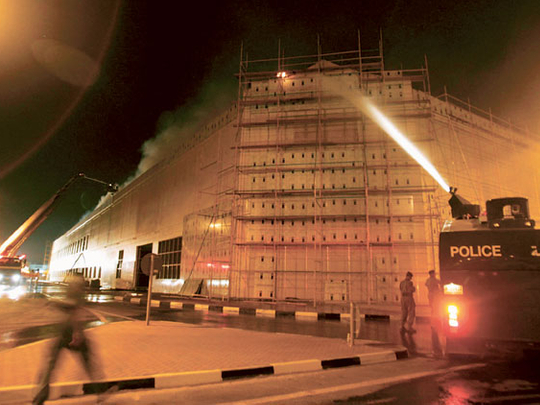
Sharjah New buildings now under nearing completion here will not be approved by municipal inspectors as completed unless contractors can prove exterior aluminium cladding will not catch fire, Gulf News has learnt.
New documents obtained yesterday reveal Sharjah Municipality is adopting a hardline approach to the widespread application of non fire-rated cladding in the wake of two major tower fires in recent months.
Hundreds of residents were driven from their apartments in the early morning when Al Baker Tower caught fire in January and when flames raced skyward on Al Tayer Tower in late April.
In Circular No. 6 issued April 29 by Salah Butti, Chairman of Sharjah Municipality's Planning and Survey Department, "all the consultants and contractors in Sharjah" have been served with official notice that the rules have substantially changed.
All cladding panels, he cautioned, must be fire-proof and withstand intense heat for several hours.
The new regulations come after a cursory glance through Sharjah building codes by Gulf News last week failed to reveal specific laws that prohibit using what is called Low Density Polythene (LPDE) aluminium cladding tiles.
Tests by Gulf News showed the LPDE tiles can burn within eight minutes compared to fire-resistant panels that remain non-flammable under extreme conditions.
"All the consultants and contractors offices who are supervising multi-storey residence towers, which are under execution stage, should inform the general department of Civil Defence for the certification," wrote Butti in his notice, "which proves that all the aluminium [tiles] used for the building facade on these buildings should be fire rated for a minimum of three hours."
Certification process
Butti also noted that contractors must prove beyond doubt that any tiles slated for installation must be accompanied by "the origin certificate and conformity certificate from the country's laboratory manufactured for these materials."
To reinforce the Sharjah government message, Butti emphasised that "Sharjah Municipality will not issue the completion certificate unless they [contractors] complete these standard procedures."
Cladding industry leader Alubond — which operates a 50,000 square-metre tile manufacturing plant in Ajman — responded well to the news yesterday.
Shaji Ul Mulk, chairman Mulk Holdings, the parent holding corporation which owns Alubond, said the latest measures by Sharjah are solid steps in the right direction.
"We are extremely pleased that Sharjah Civil Defence and Sharjah Municipality have moved very effectively to pass new regulations on fire safety standards," Ul Mulk told Gulf News.
"We are working closely with them to share our knowledge and propose fire safety standards and testing mechanisms which will be practical to implement and cost effective.
"It is important that developers and architects are encouraged to adopt new fire standards in their existing and new buildings on a large scale."
He pointed out that fire tests last month of Abulond fire-resistant cladding withstood temperatures as high as 850C without bursting into flame.
Past incident
The merits of fully certified fire-resistant cladding were evident during a major mall fire on Shaikh Zayed Road in 2006 when a massive fire gutted the original Oasis Mall, he said. The interior of the mall was burned beyond recognition and razed by daybreak.
However, Ul Mulk said that the mall's exterior — enclosed with fire retardant Alubond silver-coloured cladding panels — was the only thing left standing on the site which now hosts the new Oasis Mall.











